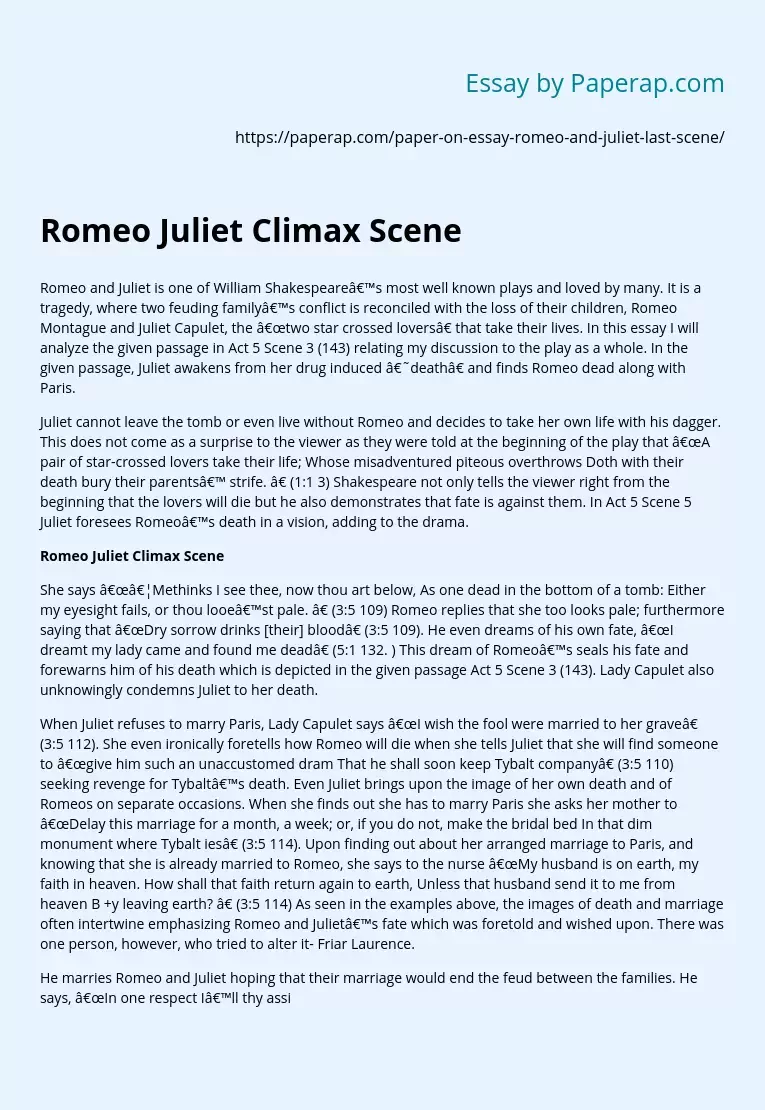Romeo Juliet Climax Scene
Romeo and Juliet is one of William Shakespeare’s most well known plays and loved by many. It is a tragedy, where two feuding family’s conflict is reconciled with the loss of their children, Romeo Montague and Juliet Capulet, the “two star crossed lovers” that take their lives. In this essay I will analyze the given passage in Act 5 Scene 3 (143) relating my discussion to the play as a whole. In the given passage, Juliet awakens from her drug induced ‘death” and finds Romeo dead along with Paris.
Juliet cannot leave the tomb or even live without Romeo and decides to take her own life with his dagger. This does not come as a surprise to the viewer as they were told at the beginning of the play that “A pair of star-crossed lovers take their life; Whose misadventured piteous overthrows Doth with their death bury their parents’ strife. ” (1:1 3) Shakespeare not only tells the viewer right from the beginning that the lovers will die but he also demonstrates that fate is against them.
In Act 5 Scene 5 Juliet foresees Romeo’s death in a vision, adding to the drama.
Romeo Juliet Climax Scene
She says “…Methinks I see thee, now thou art below, As one dead in the bottom of a tomb: Either my eyesight fails, or thou looe’st pale. ” (3:5 109) Romeo replies that she too looks pale; furthermore saying that “Dry sorrow drinks [their] blood” (3:5 109). He even dreams of his own fate, “I dreamt my lady came and found me dead” (5:1 132.
) This dream of Romeo’s seals his fate and forewarns him of his death which is depicted in the given passage Act 5 Scene 3 (143). Lady Capulet also unknowingly condemns Juliet to her death.
When Juliet refuses to marry Paris, Lady Capulet says “I wish the fool were married to her grave” (3:5 112). She even ironically foretells how Romeo will die when she tells Juliet that she will find someone to “give him such an unaccustomed dram That he shall soon keep Tybalt company” (3:5 110) seeking revenge for Tybalt’s death. Even Juliet brings upon the image of her own death and of Romeos on separate occasions. When she finds out she has to marry Paris she asks her mother to “Delay this marriage for a month, a week; or, if you do not, make the bridal bed In that dim monument where Tybalt ies” (3:5 114). Upon finding out about her arranged marriage to Paris, and knowing that she is already married to Romeo, she says to the nurse “My husband is on earth, my faith in heaven. How shall that faith return again to earth, Unless that husband send it to me from heaven B +y leaving earth? ” (3:5 114) As seen in the examples above, the images of death and marriage often intertwine emphasizing Romeo and Juliet’s fate which was foretold and wished upon. There was one person, however, who tried to alter it- Friar Laurence.
He marries Romeo and Juliet hoping that their marriage would end the feud between the families. He says, “In one respect I’ll thy assistant be-; For this alliance may so happy prove To turn your household’s rancour to pure love. ” (2:4 63) This shows the viewer that he is good intentioned yet naive and can not foresee the consequences of this clandestine marriage. In the given extract the Friar only recognizes the consequences of his plans and unexpected outcome when he finds Romeo and Paris dead.
When Juliet awakens he offers to take her to the nunnery and then flees as he hears noises abandoning Juliet as he does not want to be associated with their death. Many Christians believe that the Friar tries to play God and even believe that Juliet’s death is made to resemble Jesus’ death and resurrection. Jesus died for the sins of humankind and Juliet dies for the sins of the two feuding families. Furthermore, gradesaver. com mentions another biblical reference, when Benvolio attempts to halt the fight in the first scene, he remarks, “…put up your swords; you know not what you do” (1. . 8). This same phrase is used by Jesus when he stops his apostles from fighting the Roman guards during his arrest. Shakespeare also contradicts these religious elements with erotic elements. To commit suicide, Romeo drinks the poison from a chalice which by its rounded shape symbolizes a woman’s torso. In turn Juliet kills herself with Romeo’s “happy dagger”, a phallic symbol. In conclusion, Romeo and Juliet die as a result of the poisonous feud between their families. With their death Shakespeare resolves the major conflict of the play as the families choose to reconcile.
Fate and time is against the lovers. Romeo never receives the letter sent to him by Friar Lawrence informing him of the plans, Juliet awakes just after Romeo commits suicide and the families reconcile only after their death. Even though the audience knows right from the beginning that the lovers will die and are constantly reminded throughout the play, they can’t help but feel heartbroken. There is however a glimmer of hope, as the night has always brought Romeo and Juliet together and on this tragic night the lovers will reunite in death, defying the stars.
Romeo Juliet Climax Scene. (2019, Dec 05). Retrieved from https://paperap.com/paper-on-essay-romeo-and-juliet-last-scene/

